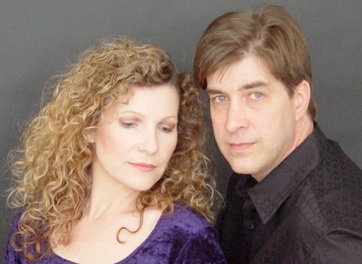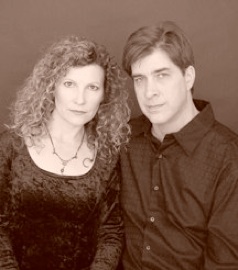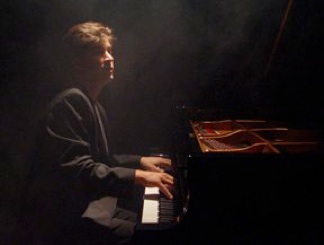While many associate 1997’s "Chrysalis" as their debut album, reality is that this was 2002’s first Billboard charting album for their prior label Real Music. A closer look at this harmonic married couple in career and life reveals that their freshman effort dated back to 1992 when they released the self produced and distributed "Wings." For over 16 years 2002 have been composing and creating beautiful music.
After a decade of loyalty to their recording label Real Music it appeared that the magnificent duo felt compelled to find a new place to call home as far as a recording label was concerned. Signing a unique exclusive licensing arrangement with Gemini Sun Records, 2002 secured the benefits of label support and distribution, yet managed to maintain ownership of their work. While there was a change in recording labels this did not change the fact that 2002 had become what appeared to be a permanent resident on the Billboard charts with the release of "Deep Still Blue" in 2007.
Since 1997 there has been no turning back for 2002 that has gone on from strength to strength. The true beauty of this writing partnership is that while their music has become more accessible, they have never strayed too far from their original musical form of quietude and peacefulness that contain both sensual and spiritual qualities. Considering the current uncertainty of our economy, 2002 continue to bring relief and shelter to the insecurities of our everyday lives.
So is it art imitating life or life imitating art for this married couple? The answer is a resounding yes on both counts as the high school sweethearts who are apparently eternally linked both in life and careers continue to create beautiful music together. Despite being one of the genre’s most commercially viable artists, Pamela and Randy Copus recently found the time to chat with Mainly Piano.
MD: With both a personal and musical marriage aligned with the stars lets get the obvious question out of the way. How did you meet? When you first met was it purely business or pleasure or affirmative in both categories?
PC: We met in high school. I was 15, Randy was 17. I had just moved to Texas from Kentucky. I was very shy and of course had no friends just yet. I was walking through the theater building in high school and heard a "hey you!" Startled, I kept walking. Not to be ignored, Randy decided it was time for something extreme. So he yelled "Do you speak Venusian?" How could I ignore a challenge like that? So I turned and replied "yes I do" and then kept walking. He was fascinated.
Over the next few months we got to know each other and began dating (once I turned 16). We both felt as if we'd known each other before somehow. There was always something so familiar there.
RC: We were in high school when we met, so we didn't have a lot of business going on then. But we did have music in common - we loved the same rock bands, and those were not always the usual groups the other teenagers were getting into at the time. We also both had an appreciation for other types of music - Jazz, classical, electronic, anything that was good and original.
MD: Living in a 24 -7 relationship how do you keep it alive and fresh?
PC: Basically we are like 2 parts of the same person rather than two separate people. We both bend and change to pick up whatever slack needs to be managed. We know that the other one can always be counted upon to rescue when a rescue is needed. And boy things do get crazy around here and rescues are not uncommon. I know we both long for more alone time but we realize it will come when it is meant to be. Right now there are other pressing matters. Our love is strong enough to understand patience.
RC: It's easy; we both love what we do, both as individuals and as a team. It never gets old because it's always changing. There's something about working and striving toward a common goal that seems to automatically keep us excited about it all. Plus we're best friends, which creates a dynamic of its own.
MD: Many of your casual listeners associate your 1997 "Chrysalis" release as your debut recording when in actual fact it was your Real Music debut. Your freshman effort dates back to "Wings" in 1992. While "Wings" and "Savitri" (1995) were commendable recordings "Chrysalis" was certainly a breakthrough recording. What transpired between 1995 and 1997?
PC: Wow, so much happened. Those were blurry years to be sure. We self-released "Wings" in November 1992 and "Savitri" in February 1995. We did not seek out a record deal (as most bands did back then). We simply did it ourselves. We created the master recording, planned the artwork, manufactured the CDs (and cassettes!) and found distribution. Things were going quite well. We had national distribution and some pretty nice sales.
Then we received a letter from Terence Yallop in August 1995 inviting us to California for a possible record deal. We didn't take it seriously at first. We had grown accustomed to a "do it yourself" attitude. But several months later when we received plane tickets from him, we realized he was serious. We had already been planning our 3rd CD, "Chrysalis" and brain-stormed excitedly about it on the plane trip to California.
Randy and I came from classical/pop/rock/jazz backgrounds. "Wings" and "Savitri," though dear to our hearts and fun to create were not the end, but rather just the beginning of 2002's musical evolution.
RC: Many things. We had been becoming steadily more successful with "Wings" and "Savitri" when we signed with Real Music, so we had some momentum, and confidence that were moving in the right direction. At that time, we could have gone in many directions musically, But Terence Yallop (Real Music) convinced us to continue in the vein of the first two. Also at that time, we made some major investments in high-end recording gear, including our first digital console. We were able to record more live acoustic instruments and capture more of the musical essence of our performances than ever before. Musically speaking, "Chrysalis" felt to us like a natural progression from where we had been. It was our third album, and we were beginning to find our voice.
MD: "Chrysalis" was to be the first of many Billboard charting albums that 2002 would create. What did it feel like for the first time?
PC: It was pretty thrilling. It was also humbling to pick up a Billboard Magazine and see our names in there. I think the best time for me was when Billboard reviewed "River of Stars." Having a review in there and also being on the chart was a great feeling.
RC: It was hard to believe. Remember, at that time paid downloading of music wasn't there yet, and nearly all sales of CD's were through retail outlets, who reported their numbers to Billboard. So if you were charting, that meant you were selling albums all over the United States, and the World. I've never gotten over how cool that is, and we will always be indebted to our fans for putting us there.
MD: It appears that Randy Copus plays electric cello, guitar, and bass while you focus on the flute, harp, and a wind instrument called a WX5. Tell us a little more about the latter?
PC: We are both multi-instrumentalists for several reasons. Again we are haunted by that "do it yourself" attitude. When you are determined to have something turn out a particular way, you best be prepared to do it yourself!! So we learn what we need to learn. Truly though, all instruments have a vibration and a life force. You have to be willing to tune into that and find the song and the voice of each instrument. The instruments are our band-mates. We argue and commiserate - at times somebody may get "fired" temporarily. But in the end the song itself is king. It doesn't matter how "cool" a particular part may be, it still might get erased if it’s not right for the song. You have to go with your guts on that one.
Randy plays so many more than the instruments listed above. He can play anything he picks up. He examines it, figures out the mechanics and then seeks the soul. It's second nature to him. I love the WX5 for similar reasons. It can meld my embouchure with a vast array of sounds. We can dial up a particular sound (or instrument sample) and I can apply the subtleties of a flautist to that sound. It's a lovely marriage of organics and technology.
MD: There is overlapping talent as far as the keyboards are concerned. How did you separate your keyboard duties in the recording studio?
RC: That's simple; we just do whatever gets the job done. We don't apply a whole lot of ego to our studio performances; it just gets in the way. So it really doesn't matter who plays a particular keyboard part, as long as it's the best performance we can put in the work.
MD: Your instrumentation is also complimented by multi layers of largely ethereal wordless vocal arrangements. Along with the densely layered keyboard arrangements, comparisons with Enya are unavoidable. Is this a reasonable paradigm? If not which fellow artist(s) inspire you?
PC: Honestly, the first time we were compared to Enya (around 1993) I asked "who?" I didn't know who she was. To this day I only have heard two Enya albums in their entirety. Please don't get me wrong. I think she's great. I just like other things more. I am inspired by many diverse artists. I love Kansas, Boston, Meatloaf, Loreena McKennitt, Foreigner, Sarah Brightman, Mozart, Journey, Styx, Danny Elfman, Heart...
RC: We don't mind being compared to Enya because we understand the profound impression that dozens or even hundreds of vocal tracks can make on a listener, possibly becoming what they remember most about a song or artist. However, Enya was not our original inspiration for this kind of production - actually it was Mutt Lang and his work with Def Leppard in the 80's, albums by Yes, Styx, Kansas, Boston... and I spent many years studying and participating in choral music. All this coupled with the fact that we had the technology and gear to even do this kind of thing, it's quite involved.
MD: What has been your biggest selling album to date?
PC: Not sure. Probably either "River of Stars" or "Land of Forever."
RC: Probably either Land of Forever or River of Stars. But those have been out for quite a while now, so it's easy to see how they have overall sold more than our newer titles.
MD: If you were forced to pick a favorite recording which one would it be and why?
PC: "Deep Still Blue." But it's about to get unseated by the new album we are working on. We have at last earned our wings and embraced our need to fly. Get ready for some surprises.
RC: It would be the current one (not released yet). Because it's so different than anything we've done before, and because we have grown so much as artists/musicians while composing and producing it. As far as from the released albums, probably "River of Stars" and "Across an Ocean of Dreams," because those were so heavily influenced by the Romantic period of classical music... but I may change my mind next week!
MD: It sounds like your latest creation may have greater sense of exploration. Would you care to give us some insight on the surprises that you refer to?
PC: We have always felt a deep spiritual connection to music and its power to change the world. This album does not strive in any way to confine itself to a predetermined genre. We have dropped the reins and held on to just the mane for one exciting ride. I hope our fans will join us and that we'll find some new friends because of it.
RC: We're definitely exploring new sonic territory with this one. It's like an artist who has been working with essentially the same pallet for a while, refining and evolving it over each work. Then one day, he decides to try a completely new pallet, mixing and using colors he's never used before.
MD: Is there a working title, tentative street date and will it be on Gemini Sun Records?
RC: There is a title, but we're keeping it under wraps for now. It will be released on Gemini Sun in February. It is as much a video work as it is a music album.
MD: After so many years at Real Music as the flagship artist with the ability to self promote via the internet, website and downloads what prompted the move to another label?
PC: Realize we had been with Real Music for 10 years. Although it was definitely time to move on and be free to evolve our music we still wanted to make hard copies of any new albums available to our current "brick and mortar" partners. Distributors do not pick up one or two titles from someone. You have to be part of a larger catalog to warrant mainstream distribution. If it were only a matter of digital downloads, you're right; the need to have a record label is not the same. But there is an aspect that you might miss out on if you strictly market yourself via the Internet without label support - the comradeship of fellow artists. Being part of a progressive, modern label like Gemini Sun is like being part of a family. You have support from respected peers yet you also have a lot of creative freedom that traditional labels will not allow you to have.
MD: Gemini Sun Records continues to grow and is becoming a prominent label in the genre. Considering the commercial draw of 2002 I am sure you had several labels pursuing. Why Gemini Sun Records?
PC: The president and owner, Nicholas Gunn is a talented composer and musician. He is in a unique position to empathize with the artist and to treat the artist not as a commodity, but rather as a partner.
RC: Once we had completed our contract with Real Music, we were not of the mind to sign up with another label in the traditional sense, where they own and control everything, including the masters and the publishing. GSR offered us an exclusive licensing arrangement whereby we could have the benefits of label support and distribution, yet still maintain ownership of our work.
MD: Surprisingly your 2007 Holiday affair "Christmas Dreams" was released independently. Was this during your transition period from one label to another
or was there another intent?
PC: We had been asked by fans for more years than I can even remember to please put out a Christmas album. But Real Music did not want us to do that and so we were not at liberty to do so. We completed it way too late last year for a label release so we released it ourselves. We have since licensed it to Gemini Sun and it will be re-released in September on GSR with some slight modifications.
MD: Digressing a little, back in 2003 both of you appeared on Kevin Kern's album "The Winding Path." Was this a label promotion decision or was there a kindred spirit between artists?
PC: I'll always have a soft spot in my heart for Kevin. He is a gentle soul and a talented composer and musician. He personally invited us to join him and it was an honor to do so.
RC: We were asked to add some elements that would compliment what was already, in my opinion, a great record. We didn't want to be overbearing or try to put our sound all over it. We just wanted to add some sonic support that would help highlight Kevin's unique artistry.
MD: "The Winding Path" is my opinion is Mr. Kern's finest hour to date and probably his most organic effort to date. Has 2002 ever considered releasing a more organic album with a full orchestra?
PC: That would be fabulous. It's fairly cost-prohibitive though. Hiring a full orchestra would be 10s of thousands of dollars unless it was done outside of the U.S.
RC: Hmmm, maybe that's next! I have to admit, it would wonderful to be sitting in a concert hall listening to a full orchestra play our music.
MD: You were once quoted as saying that “Music is an extension of all that is natural and so has the power to restore the natural balance of joy and healing” Would you care to expand on that thought?
RC: All music affects people and things profoundly, whether they realize it or not. It is because the components that music is assembled from are all rooted in absolute universal physical law - the octave, the cycle of fifths, the seventh- spin a hollow, flexible tube around at different speeds and listen to the tones it makes, to see what I mean.
And there's the mysterious "comma" Pythagoras noted, which demonstrates a spiraling in music that we find replicated throughout nature, especially in life. So, does music affect our DNA? I don't see how it couldn't.
Michael Debbage
August 2008




